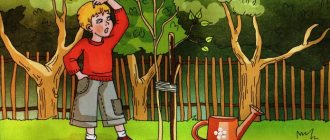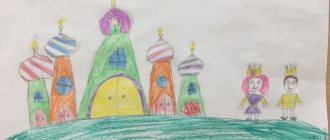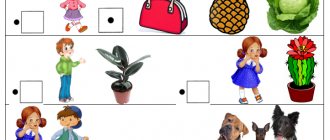Preparatory group. Senior preschool age. Children 6-7 years old
Integrated speech therapy lesson with children of senior preschool age “Travel to the planet Tsvetsistemzia” Summary of a speech therapy lesson with children of the senior group “Travel to the planet Tsvetsistemzia”
.
Goal: Automation of whistling sounds (S, (Z, (C))
in syllables, words, phrases with design elements from Lego robots, additionally conduct an experiment with coloring colors...
Technological map-summary of individual-subgroup speech therapy OD on sound automation [Ts] in children 4–7 years old Topic: “Sound Ts”
(“Automation of the sound C in reverse syllables, words, sentences and texts containing reverse syllables with C) Goal: Automation of the sound C in reverse syllables, words, sentences and texts containing reverse syllables with C. Objectives: 1. Train correct pronunciation...
Speech therapy lessons
Create your teacher website PC and PPC courses Video lessons Olympiad Webinars for teachers
- home
- Speech therapy
- Lessons
Watch and download free lessons, tests, notes, presentations and other useful materials on speech therapy for teachers and students. In this section you can get speech therapy lessons .
- All 4377
- Lessons 1425
- Presentations 617
- Tests 19
- Planning 194
- Events 308
- Other 1814
- All classes
- For preschoolers
- 1 class
- 2nd grade
- 3rd grade
- 4th grade
- 5th grade
- 6th grade
- 7th grade
- 8th grade
- 9th grade
- Grade 10
- Grade 11
| SUMMARY OF Speech Therapy Lesson “Automation of the sound Z in words, sentences and games.” SUMMARY OF A Speech Therapy LESSON with a group of 1st grade students, 01/11/2022 Dolmatova Larisa Dmitrievna 13 0 |
| Differentiation of sounds K-G Speech material for speech therapists to differentiate sounds k-g... 01/18/2022 Chiryatieva Natalya Vladimirovna 1 0 |
| Notes on speech therapy on the topic “Types of verbs” Purpose: to consolidate students’ knowledge about verbs. Planned results: Subject: teach children to use perfective and imperfective verbs. 01/18/2022 Merkulova Daria Dmitrievna 4 0 |
| Outline of a speech therapy lesson “Prepositions and prefixes” Topic: Prepositions and prefixes Goal: developing the ability to differentiate prepositions and prefixes. 01/17/2022 Budnikova Marina Evgenievna 7 0 |
| “Automation of the sound Ш” This development may be of interest to teachers and parents. A correctional and developmental speech therapy session will help consolidate the sound Ш in the child’s speech…. 01/09/2022 Berdnikova Elena Vladimirovna 9 0 |
| Methodological development of a speech therapy lesson on the development of lexical and grammatical means of language Detailed lesson notes. Help for a young specialist... 01/14/2022 Kopytova Nadezhda Petrovna 18 0 |
| Summary of a speech therapy lesson “Prepositional-case constructions of nouns” Date________ No. Lesson______ Class_______ &nbs… 11/16/2021 Budnikova Marina Evgnevna 90 3 |
| Summary of the speech therapy lesson “Words denoting the signs (quality) of an object.” Introducing children to sign words, what questions need to be asked of them, why they are needed, what role they play in the Russian language... 12/07/2021 Kuizheva Zamira Nalbievna 76 0 |
| SUMMARY OF Speech Therapy LESSON “Automation of the pronunciation of the sound R in pure tongues and the text “Two Friends.” SUMMARY OF A Speech Therapy LESSON with a group of 1st grade students, 01/11/2022 Dolmatova Larisa Dmitrievna 53 0 |
| Combined game-activity “In the country of SHI” The combined game-activity “In the country of SHI” promotes the formation of correct sound pronunciation, the development of phonemic… 12/16/2021 Savina A.N., Chistyakova E.V., Gannochenko T.A 37 0 |
| SUMMARY of a speech therapy lesson on the topic: “Winter” Activation of cognitive and speech activity. – consolidate students’ knowledge about the season “Winter”; - expand... 12/16/2021 Svetlana Sergeevna Shevchenko 89 0 |
| “Acquaintance with the poems of A. Barto” Goal: to continue acquaintance with the work of A. Barto, to cultivate good feelings and positive emotions. Tasks 12/15/2021 Batishcheva Anzhelika Vladislavovna 25 0 |
| Notes for a lesson on RSV and AF in the preparatory class “My Family and Friends” notes are intended for remedial classes with hearing impairment…. 12/19/2021 Mikheeva Anna Anatolyevna 35 1 |
| Open lesson on the topic “Sound and letter Z” Lesson summary for a young specialist. Detailed description of all stages of work... 01/10/2022 Kopytova Nadezhda Petrovna 32 1 |
| SUMMARY OF Speech Therapy Lesson “Differentiation of vowels A-Z in syllables, words, sentences. Analysis and synthesis of words and sentences. Text "Stocks for the winter." SUMMARY OF A Speech Therapy LESSON with a group of 2nd grade students, 01/11/2022 Dolmatova Larisa Dmitrievna 15 0 |
| Individual lesson on the formation of pronunciation and the development of speech hearing in the 1st grade. The sound “Ch” Individual lesson on the formation of pronunciation and the development of speech hearing in the 1st grade with a student with a 3rd degree of hearing loss. Theme "Sound &... 12/13/2021 Shoshina Valentina Leontievna 38 0 |
| Notes on speech therapy on the topic “Differentiation V-F (V`-F`) Purpose: to consolidate knowledge about the sounds V-F (V`-F`); teach children to differentiate V-F (V`-F`) in words. Planned results: Subject: consolidate knowledge about sound... 12/14/2021 Merkulova Daria Dmitrievna 71 2 |
| Methodological development of correctional and developmental classes in speech therapy "a journey through the poems of a. Barto" Goal: to continue acquaintance with the work of A. Barto, to cultivate good feelings and positive emotions. Tasks 12/13/2021 Batishcheva Anzhelika Vladislavovna 30 0 |
| Combined game-activity “In the country of Chu” Combined game-activity “In the country of Chu” promotes the formation of correct sound pronunciation, the development of phonemic… 12/16/2021 Savina A.N., Chistyakova E.V., Gannochenko T.A 32 0 |
| Lesson on the formation of auditory perception and teaching oral speech. Text “Bullfinches” (1 lesson). Automation of sound [р]. Lesson on hearing and speech development. During the lesson, the sound [r] in words was automated. in words, in phrases, in sentences, on the material of the text “Bullfinches”. the lesson was conducted with a student in violation... 12/09/2021 Lukina Marina Dmitrievna 65 2 |
- ← Back
- Continue →
Speech therapy classes - Summary of individual speech therapy classes on the topic “Vegetables”
Publication “Summary of an individual speech therapy lesson on the topic...” Synopsis of a lesson on the topic “Vegetables” Objectives: Teach the student to select attribute words for objects. Strengthen the ability to coordinate adjectives with nouns in gender, number, and case. Develop general speech skills: breathing, pace and rhythm of speech, attention, thinking, general...
Image library "MAAM-pictures"
Summary of GCD in the senior speech therapy group on literacy “Sound [Z]” Summary of GCD in the senior speech therapy group on literacy “Sound Z”. Target. Clarification of the pronunciation of the sound “Z”, determination of the presence of a sound in a word and its place, syllabic reading according to the scheme. Exercise in clear pronunciation of words with the sound “Z”. composing sentences with the sound “Z”. By…
Summary of a speech therapy lesson in the senior group “Differentiation of sounds [z] - [s]” Synopsis of a subgroup speech therapy lesson in the senior group Topic of the lesson: “Differentiation of sounds [S] - [Z].” Progress of the lesson: 1. Organizational moment. - Hello guys! Today we continue to get acquainted with the sounds [C] and [Z]. - Children, let's remember the songs - the sounds...
Summary of educational activities on speech development with elements of logorhythmics in the senior group “Transport” Goal: Children must learn the names of types of transport (car, bus, tram, plane, rocket, missile, motorcycle, elementary parts of cars (cabin, steering wheel, pedal, body, wheels. Objectives: correctional and educational: 1. Expanding ideas about types of transport. 2. consolidate and…
Summary of a frontal lesson in a preparatory speech therapy group
Abstract
Frontal classes in speech therapy
school preparatory group
on the topic:
“Sounds [m], [m'].
Letter M." TARGET:
introducing children to the sounds [m], [m'] and the letter M.
Tasks
:
- Correctional-educational tasks:
clarification of the articulation of sounds [m] - [m']; familiarization with the letter M; fixing the image of the letter; consolidate the skill of isolating consonant sounds from a word, determining their place in the word (beginning, middle, end).
- Corrective and developmental tasks:
development of phonemic perception and hearing, thinking, attention, speech, coordination of movements, fine and gross motor skills.
- Correctional and educational tasks:
fostering a positive attitude towards learning activities, independence, activity, and respect for each other.
EQUIPMENT
: a typesetting canvas, a display box of letters, counting sticks, object pictures, a checkered board, simple pencils, large-checked notebooks.
Progress of the lesson:
I. Org. moment.
Greeting creates a positive background for the lesson.
II. Reinforcing the material covered.
— In the last lesson we went over the sounds [k], [k']. Think of words with the sound [k], and now with the sound [k'].
III. Education.
- Today we will get acquainted with new sounds and letters.
— Listen to the first riddle:
Loves cheese and crumbs. It's a cat? No, not a cat. Knocked a testicle with her tail. Is this a bird? No, not a bird. The pencil also chews on books. Did you guess it? This is... (mouse)
And now the second riddle:
He loves raspberries, he loves honey, and in winter he just sucks his paw. By spring he wants to lose weight. ... (a bear) sleeps in his den
Well done!
– What sounds do we hear first in the words MOUSE and BEAR?
- That's right, today in class we will work with the sounds [m], [m'].
Characteristics of sound by articulatory and acoustic characteristics.
—
pronounce the sound [m]. The lips are pressed together, they do not let in air, but he has found a way: the air goes through the nose.
—
What sound [m]? (consonant, hard, voiced) how is it indicated? (in blue) how are the lips positioned? (close tightly) - lay out the symbols on the board.
- The sound [m] has a brother sound [m']. Let's say it.
- What is the sound [m']? (consonant, voiced, soft) how is it indicated? (in green) in what position are the lips? (lips close in a smile) - lay out the symbols on the board.
Development of phonemic hearing
Game "Hard - Soft"
Goal: differentiate the sounds [m], [m'],
Progress of the game: the speech therapist shows pictures, naming the word, the child determines what sound is heard in the word.
Introducing the letter M.
—
Let's remember how letters differ from sounds? You and I know that each sound has its own sign by which it is designated. Let's get acquainted with the letter M: (the speech therapist asks to lay out a letter on the table from counting sticks)
- A stick and a stick, with a tick between them. And it’s clear to everyone right away that the letter M comes out.
IV. Phys. just a minute:
a) Exercise “Bear” - development of general motor skills.
A clubfooted bear is walking through the forest. (we walk in place, waddling from foot to foot) Collects cones and puts them in a basket. (collecting imaginary cones) Suddenly a cone fell - right on the bear’s forehead! (we hit ourselves on the forehead with our hand) The bear got angry and stomped with his foot. (stomp our foot)
b) Gymnastics for the eyes:
Exercise “Bridge” - strengthens the visual muscles.
We close our eyes, these are the miracles (Close both eyes )
Our eyes are resting, doing exercises eyes closed )
And now we will open them and build a bridge across the river. (Open their eyes , draw a bridge with their gaze)
Let's draw the letter "O"
, it turns out easily (Draw the letter
“O”
)
Let's lift up, look down ( Eyes look up , look down)
Let's turn to the right, left ( Eyes move left and right)
Let's start practicing again.
V. Consolidation of new material.
a) “Catch the right sound” - development of attention, sound analysis, isolation of consonant sounds [m], [m'] from words.
- When you hear the sound [m]: among other sounds in the word, clap your hands.
In words: cat, March, crane, mosquito, hut, lump, boot, carrot, pine.
b) “The fourth odd one” - the development of phonemic perception, attention, logical thinking.
To play the game you will need four pictures depicting objects, three of which contain the sound [m] in the name, and one does not (matryoshka, car, tangerine, pineapple). An adult lays them out in front of the children and asks them to determine which picture is extra and why.
c) Introducing the letter M. The speech therapist shows the letter, prints it on the board, and the children print the letters in notebooks.
VI. Summary of the lesson.
Topics for open classes
Choosing a topic is not an easy task, since the specialist will have to demonstrate something new. You can use thematic calendar planning.
Lexical topic “Transport”
Equipment you will need is a set of thematic pictures, a bag of small toys, and model airplanes and trucks. On the lexical topic “Transport” in the senior group, the speech therapist aims to expand ideas and form vocabulary.
At the organizational moment, riddles are asked to each child. Afterwards, the teacher asks leading questions and asks the children what will be discussed. All children are given a picture of a vehicle, and they tell them what they will use to go to kindergarten.
Important! Group work involves the participation of the entire team.
Next, a task is given with the need to complete the sentence. Discuss different types of transport with children - water, land, air. In the middle of the lesson there is a physical education session.
On mock-ups, parts of the machine are disassembled - the nose of the aircraft, wings, tail, etc. The end of the lesson is accompanied by a brief summary. As homework, they are asked to come up with a drawing of “travel to another country” and each child chooses his own mode of transport.
Analysis of educational activities in preschool educational institutions according to the Federal State Educational Standard
Theme "Mom's Day"
In kindergarten, preschoolers must receive a certain set of knowledge, skills, abilities - this is enshrined in the Federal State Educational Standard. Therefore, the teacher and speech therapist conduct classes dedicated to various holidays.
Exciting games allow you to form ideas about certain traditions
The family plays a big role in raising a child. Therefore, the teacher begins the lesson with a short introduction. He brings a small package into the office and offers to find out what is hidden in it. Inside is a message written on a postcard.
The teacher talks about March 8th as a mother’s holiday. Then various tasks are offered: “clean up the picture,” “buy groceries at the store,” “housework,” “cook dinner for mom,” etc.
Theme "Spring" for the middle group
When holding any event, the age characteristics of children must be taken into account. Speech therapy classes in the middle group are carried out according to the same plan as in the senior group. But simple material is selected for it.
At the beginning, a short physical education session is held, then spring phenomena are discussed with the children - melting snow and ice, warming, etc. Next, preschoolers are asked to remember which birds return at this time of year.
Important! You can invite them to describe an animal that also wakes up in the spring - a bear. Another option for the task is “name it affectionately.”
The theme “Spring” speech therapy lesson in the middle group should achieve certain goals. In this case, it is necessary to develop a thematic vocabulary.
Topic "Furniture" in the senior group
Throughout the year, children are introduced to different materials. At the beginning of the lesson, they are given a small task (“call your friend affectionately” or something else). Then thematic sets of pictures are distributed. The lexical topic “Furniture” in the senior speech therapy group is aimed at developing vocabulary.
To begin with, children are given thematic riddles, then they are asked to listen to the words and eliminate the unnecessary, in addition they are taught to select signs for the subject.
You can start the lesson with the task “find what is wrong in the picture” or others. In the middle there must be a physical training session. The lexical topic “Furniture” in a preparatory speech therapy group may include tasks with letters. For example, “find the mistake in the word.”
Theme "Family"
For the development of coherent speech, it is important that the child can communicate on everyday topics. Everyday events are used for this. During the lesson, children discuss who the family members are, what they do and what professions they have.
Types of thinking in preschool children
Theme: “Travel through the taiga”
In the garden, children should receive their first ideas about the world. Therefore, they are told about the features of nature - what wild animals live where, what they eat and what they do.
Lotto and other games help make the activity interesting
An effective means of developing speech is to compose a short story using reference pictures. This will teach children to formulate thoughts correctly. They must clearly understand the difference between wild and domestic animals.
Theme "Hats"
The organizational moment begins with riddles. Next, the toy Dunno is shown and the teacher draws attention to his headdress - a blue hat.
Examples of tasks are “Count”, “what is a thing made of”, “what hats were given to whom”, etc. You can add questions about what hats are worn in the fall and other seasons.
For all tasks, visual material must be used. Additionally, you can ask what sound the word begins with. During work, children must change types of activities and therefore physical education sessions are carried out with them.
You can give tasks to eliminate unnecessary things: “Do they wear a cap in winter?”, “Do they wear a hat in summer?” and so on.
Important! All children must participate during the lesson.
Be sure to disassemble parts of the headdress - brim, visor and others. You can find out what clothes the children remember. The speech therapist needs to select interesting games that will attract attention. In the older group, you can add riddles to develop literacy - add a letter, etc.





